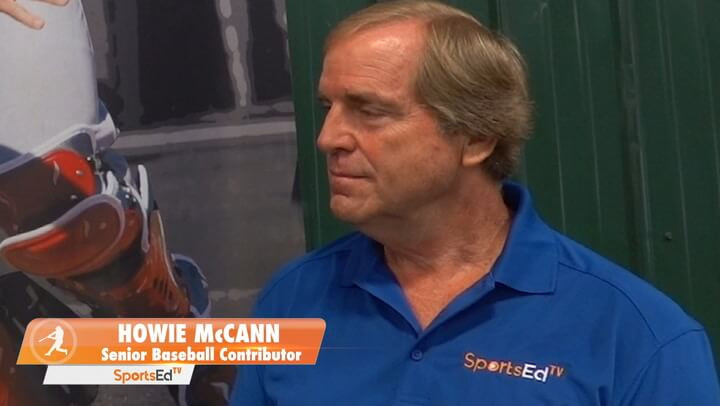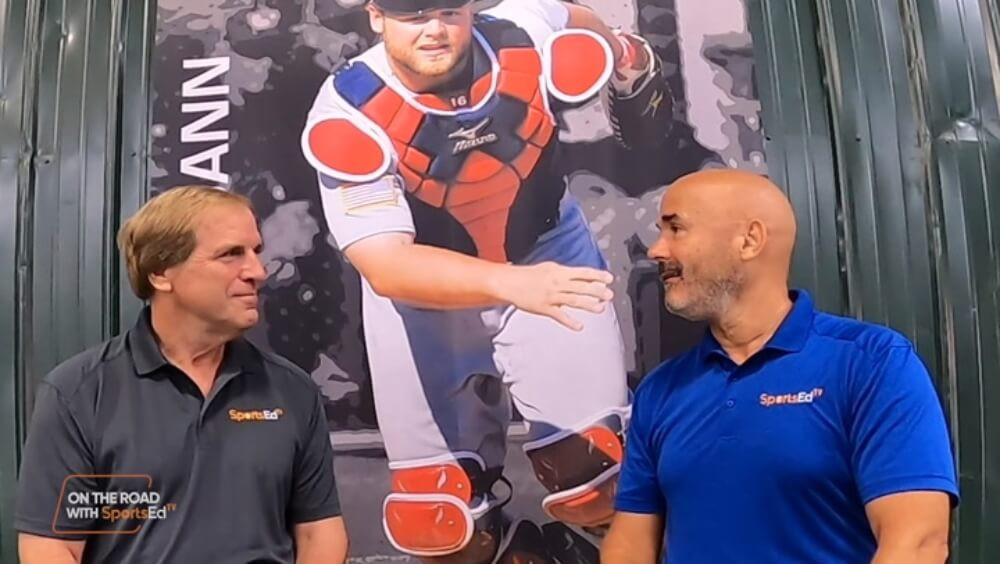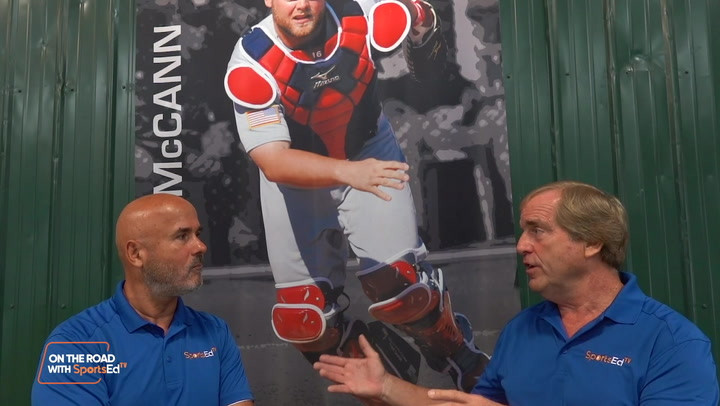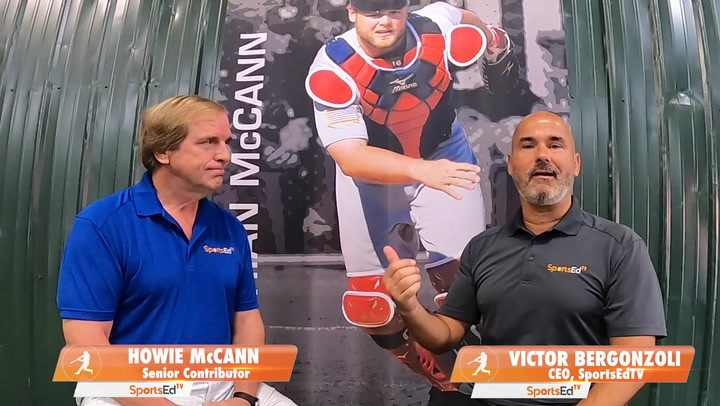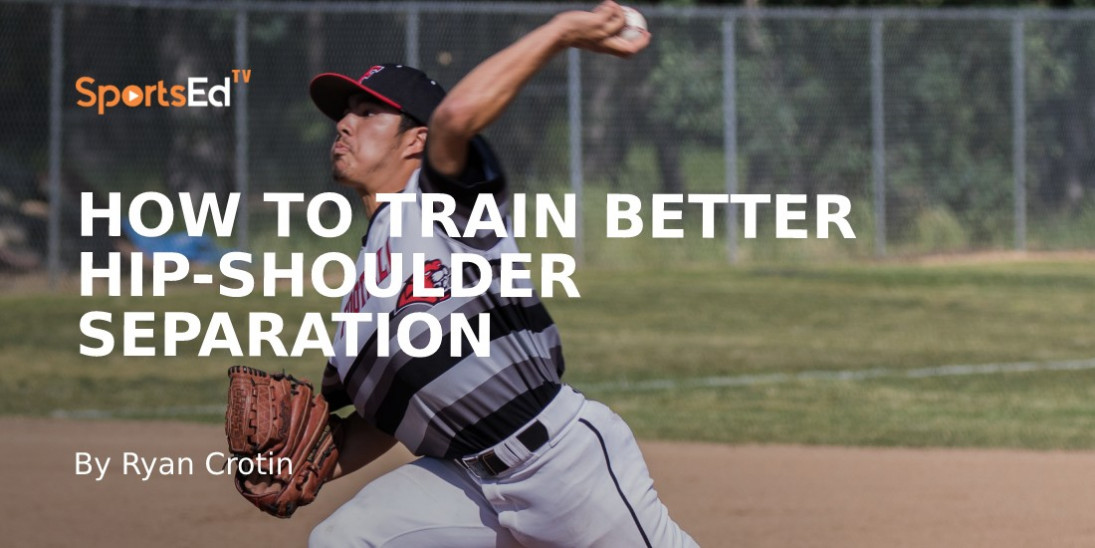Baseball
Welcome and thanks for visiting...

SportsEdTV Talks to Howie McCann (Age 9 to 12)
VB: This is Howie McCann and Victor Bergonzoli and this is the third week we meet. And today it's going to be exciting. We are going to speak about ages 9 to 12. We previously spoke about coaching ages 3 to 6, and we went from 6 to 9. Now things are getting serious. Very serious. Yes.
HM: This is when the kids really get serious about baseball in my era called Little League Baseball for ages 9 to 12. Today's baseball, they usually go 9 and 10, 11 and 12. So, but this is where the kids really start separating. The better players start getting better. The average player is still average, and it starts to see the better players kind of elevate and the lesser players, not so. So, this is a huge age.
VB: Tell the biggest difference between, you know, six to nine and nine to twelve.
HW: Well, the big thing is pitching nine and 10 players, they pitch at 46 feet. And then when you're 11 and 12, you back it up to 50. So, you have to be able to hit fast balls and change-ups. I don't teach curveballs. If you're a parent out there do not teach your son a curveball until 13 or 14, don't hurt his arm is what I always tell people. They're changing speeds, which is harder to hit, but the pitching gets better and the defense gets better, the kids get bigger, faster, stronger. And a lot of times the lesser players don't continue to play. They move on to other sports.
VB: And do they train, work out more?
HM: Yes. If your son or daughter and same thing with softball, if your son or daughter start to go, man, this is what I really want to do. I want to play baseball. That's when most of my students come here. This age when team usually works out twice a week instead of once, and then you play every weekend when I say every week-end, a good coach, in my opinion, will play two or three weekends in a row and take a weekend off to let the kids kind of recharge.
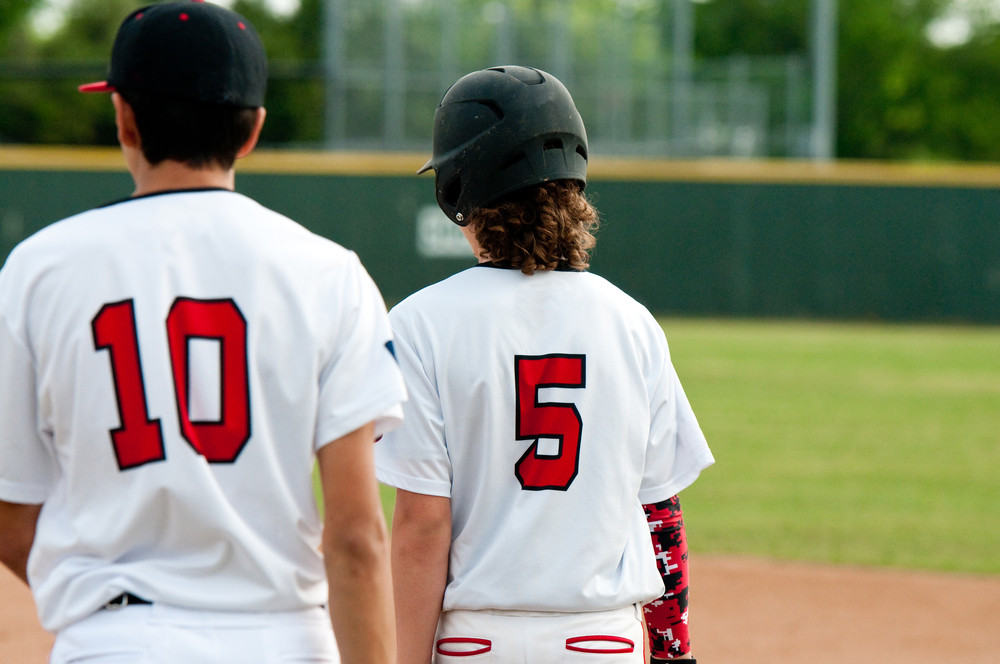
VB: Yes, and offseason. Do you work out?
HM: Yes. Most of the kids will play football or other sports, which we talked about, but they still come in for a week of throwing and hitting.
VB: Even if they play another sport, they keep active?
HM: Because schools in Atlanta, the kids start getting it. You know, we start working the kids out January because the kids end up playing at end of February because of the weather.
VB: It's amazing, so they play Saturday and Sunday, do all of them play? It's important. How do you differentiate the teams? Do you have an all-star team at this age? How does it work?
HM: Well, REC Ball. They'll play the REC season, you know, and these are the kids that do not play travel and travel ball is really blown up in the United States. And the real good players, the real good players play travel ball. And if you don't want to play travel, you don't want to give up your weekends, then you play REC Ball. So, there's that's why I'm saying the nine to 12 is there's kind of a division, you know, the better players elevate and the lesser players don’t. So, let's go REC ball first. REC ball guys usually play twice a week and maybe practice twice a week and one day said they have off--Sundays. All the travel guys practice a couple of days a week and then they play Friday, Saturday, Sunday. So again, there's a differential. These guys get better with these guys, so they play a lot more.
VB: Does it mean that if you're not on a travel team when you're between nine and 12, that you are not going to make it?
HM: Oh, goodness, no. I've had kids that are nine that are this big. They’re just really small kids. And suddenly at 12, when they blow up here, the one thing I can tell the parents is continue to play. As long as you play, you're getting better. OK, now, when we talk about 13 to 15, that's when you start to get ready for high school. And as we said in previous episodes, the only time I worry about your son or daughter is making a high school team. So this if you got a little nine-year-old and he's not ready to play every weekend and always tell parents you guys know your son or daughter better than we do, and if you think your son can't play every weekend, then don't get him involved in that. If he wants, if he's a go getter and he wants, this is what he wants to do and you try to find a team.
VB: So how do you deal with a kid who wants to make travel ball but he doesn't get drafted?
HM: Well, I had a kid in the other day. He tried out for three or four teams, did not make the travel team. OK, now that kid really wants to play. Then he's back at REC. And again, this is fall ball. It just turned September up here. But he's playing fall ball with the idea he'll try again in the spring. And, you know, six months from now, this kid, you know, he may blow up another, you know, ten pounds here. We get him a better swing, a better arm slot, you know, so hopefully, he'll be good enough to play.
VB: Good. So don't give up.
HM: No, goodness, no. I told you one of the episodes earlier, there was a guy named Andy Benice and a great career story in my era. And he went to a small school in Bloomington, Indiana. But don't quote me on that one. I know, but it was an Indiana University and he probably went in as a, you know, one hundred eighty-five pound pitcher. Four years later, the guy weighs two-thirty and instead of throwing eighty-five, he throws ninety-five. And he's the number one pick in the draft. Today's baseball Strasberg of the Nationals, you know, came out of high school throwing 85 86, which is good high school velocity. When I say that, that's why he's going to count. But three years later, he's on 95 and he's the number one pick of the Nationals. So like any sport and I mentioned this to you earlier, you're a successful business guy and you should have confidence in aggressiveness and with your son or daughter, you got to keep going and don't let them make a decision. Oh, I didn't make a travel team, so I'm not going to play anymore. Don't let them do that. You got to find a team that works for you, your family and your son or daughter and then grind.
VB: Yeah, that's very important. You know, I think it's too early. And what I have seen in many other sports is they don't make the travel team or they don't make the all-star team. And they like, I'm going to stop. I'm going to do something else.
HM: Well, I always give life lessons here. You know, we've talked about this before. You're going for a job interview. You don’t’ get the job. And are you going to quit working? Quit trying? I talk about coaches. You're going to get a coach for a boss similar to you, Victor, but you get a boss. He’s a great guy. But you get a guy that, you know, you really don't like/. What are you gonna do, quit your job and not work? Well, you suck it up and you go to work and maybe look for a new job. So your kids this age are really fragile. And I understand nobody likes rejection. Nobody likes to try out for a team and not make it. However, you've got to keep those guys playing.
VB: So I make the team I'm I do two workouts a week. So you do that with the team. Then they come and they take private lessons?.
HM: Yes, What my business is Victor, is your son or daughter makes a travel team. He's a second baseman. He's hitting ninth eighth, but we want to move him up in the lineup. So we'll work 40 minutes on hitting good mechanics and then we'll also work on his defense in second. And we've taken kids that hit eighth and ninth to start the season. And by the end of the season, they're hitting three and four. And you put your best hitters, you know, one, two, three, four, five. That's my job.
VB: How many times a week do they come for a lesson?
HM: Once. Just once a week. Once a week. I've got some kids that go twice, but their dad travels and I'm kind of their PE coach.
VB: That's great. What about REC kids, same?
HM: Same thing. I always tell the kid doesn't make the team, the travel team, he goes into REC baseball as long as he's playing and practicing, he's getting better and you got to keep getting better. I always tell kids this age, as long as you keep going north, you keep all these guys underneath. But as soon as you level off all these guys jump ahead of you. You're the odd guy out. And that's, again, is as a young parent out there. We want your son or daughter to play high school sports. And if you could play high school sports, then all the right stuff, REC and travel is worth it.
VB: Do you work with coaches? I mean, a lot of these coaches, parents, you know, youth coaches, they don't know what you know? What do you do to help them?
HM: Well, the cool thing that your business, SportsEdTV with this is going to do the for the average coach or the dad or the fans, it's going to give them an opportunity to go learn how to teach. You know, I'm an accountant and I don't know how to teach it. But hopefully, you go to Victor's channel and there's a way how to hit. And that's what we're trying to provide for the parents. But I do a coaches clinic all over and, you know, practice organization, how to hit, how to take ground balls, how to throw. One of our earlier segments, we talked about throwing. You want to make sure your elbow is above the shoulder. Well, it's a nine twelve nine through 12. If your son is still throwing here, he's going to have elbow problems and he's not going to be very good pitcher. So all of the sudden, if you can get him up here, he's going to throw the heck out of it. And how hard will you throw? No one knows. But so coaching, if you're coaching the correct way. And that's kind of my job. And then I help coaches understand how to coach.
VB: So how many coaching clinics do you offer?
HM: Oh, my God. Well, I'm involved up here at a place called Hopewell Bell Memorial. I do a clinic for them every year and Sharon Springs behind me. Roswell, I'm kind of if you came in with your son or daughter, then I'm trying to teach the dad how to teach his son. There's a lot of places like mine. They don't like parents. I love parents. I'm that guy. You know, I want to help the parents get better.
VB: Do you offer some remote advice?
HW: Well, I think we're I think the SportsEdTV will be that channel. You know, once we get into the baseball part of it, I think you can go to Victor's channel and, you know, how do you hit you know, how do you turn a double? Like, how do you throw you know, how do you run the bases? How do you turn a double play?
VB: Good. Now let's speak a little bit. You know, these kids 9 to 12 to these boys and the girls to be they want to look at the stars on TV and they want to look like that. And I'm not speaking about muscle. What do you do at this age to strength and conditioning?
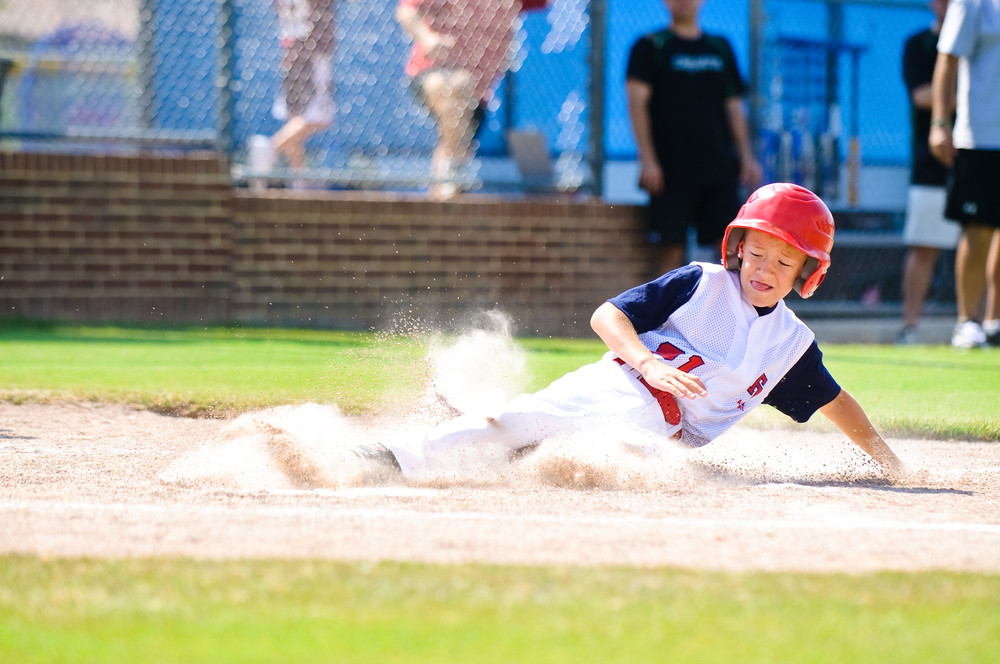
HM: I always tell people who come to see me. I'm really big at don't hurt your son or daughter. Weight training at this age because their muscles aren't developed yet. I always say that until you hit puberty, you're not going to build muscle mass. Now you can get stronger. Now what I like to tell baseball people, you know, do push-ups, do sit-ups, probably the best thing you can do is a hitter is just take up an old broom handle, drill a hole and drop a piece of rope and put away the smallest weight you can get on the bottom. And just do wrist rollers. You roll it up, you roll it down, you roll it up, you roll it down. So you hit, I am hitting guy, but you hit with your hands first and forearms. That's what you hit from. So anything you can do to strengthen this part of your body is imperative for hitting, but that the bench presses and the squats. And at this age I wouldn't do it.
VB: Plyometrics. I mean, basically using your body.
HM: Yes. Pull-ups are great. Anything low weight. High reps. OK, and no more. The bodyweight like to pull-ups. You are just pulling up your body. When I was a kid, you and I talked about this before. I hated the rope. You know, I'm in Gym class and the coach would say, OK, climb up the rope and touch the ceiling. I couldn't do it and there's a technique for that. But you got to pull your own body weight.
VB: So, Brian, Brad your sons, 9 to 12. Tell us a few stories.
HM: Well, the coolest thing, I was at Marshall University as the head coach in those years. And we played Little League. And again, that's their era and my era. Well, 9 played with 12 and the coach took both kids. I wouldn't let the kids pitch at 9 against a 12-year-old. You're only 46 feet away and some big old kid hits a line drive. I wasn't going to let him pitch, so they started pitching at ten. Now, one of the coolest things I've ever done as a dad coach is at 9 and 10 All-Stars. And I had Brad at 9, Brad at 10, Brian at 9 and then Brian at 10. So I did this three years in a row and, you know, we played the REC league we picked the all-stars. So we got the 11 best kids in the league and then I get three or four dads. Let's say you were my guy. You're my outfield coach. I have another guy. And I felt like, you know, Bobby Cox sitting there going, OK, Victor, you go do this, you go to this. And we practice every other day with you. And they had a state tournament, you know, for 9 and 10-year-olds. So we went to win the state of West Virginia State tournament. And it was most fun, I think I've ever had the best story that I had. And this was when practice would end. It didn't end. Every kid had to throw a bullpen. Every kid had to pick. So you can imagine me sitting out on a bucket catching every kid, eleven kids well, and I to write in order. So if you're the number one pitcher you threw first, so your son is number one. So you had to sit there another hour to wait, you know, for your son to throw, but everybody throws one. So we get into you know, they count pitches in innings and all that stuff. So we're the number one seed in this team has to beat us twice to win our region. So I got a game. If we don't win, they got to beat us tomorrow. And I got my whole stable of arms coming tomorrow. You won't beat us tomorrow. I got three or four guys, but right now I got two guys and I never threw kids more than two innings. So we're tied after six innings. So I put my number one guy in the pitch and everybody looked at me like, “what are you doing now”? I knew the rules. I got my horses tomorrow. So we lose. I come back tomorrow. OK, so I put this kid in and he gives up a run. But we come back and score two in the bottom of the seventh to win. So we win the championship, get the trophy. And I never forget his dad came over and he goes I can't believe you put my son in the pitch. I go, why not? I say he's been working his tail off. He pitches every other day with me. I know he could throw strikes, so I put him in and he goes, Oh my God, I can never thank you. I could never thank you enough. There's no, no, no thank you. You know, thank you for having enough confidence in me to teach your kid how to get better. And my two kids, that was a big deal to win in the 9 and 10 region. Then you go to the state tournament and that's you get to Western, you get kids from Beckley in South Charleston, you know, Morgantown, and they all converge in one place. So that's kind of cool. I really enjoyed that.
VB: You know, we just had a blog on to never be a child's last coach, and I'm sure that none of your kids.
HM: Well, unfortunately, in baseball, as you know, very few people ever, ever do what Bryan did, you know, walk up to a podium one day. Look, I can't do this anymore. I'm retiring from baseball. It's usually a high school coach, professional scout,a general manager of a big leaguer. And that's what I'm saying. Up until the high school coaches, the big one I mentioned this in an earlier segment, people come in all the time. They go, hey, Howie, have you ever told a kid he's not good enough to play? Never, because that's not my job. You know, my job is to prepare your son or daughter to make the high school team. Your son played lacrosse. You know, lacrosse player got into high school play. Now, did he take it to the next level? We'll wait and see. But kids at a very young age, at 10 or 11, do not let them. Oh, I'm not very good. I didn't make the travel team, so I'm going to shut this down or you go to soccer or lacrosse and you're not fast enough. The cool thing about baseball is any body type can play and there's a position for you out there to play baseball.
VB: Nice. Well, I look forward to the next segment and we'll speak next week.
HM: Yeah, well, 9 to 12 is a big one because we mentioned next week is 13 to 15. This is where the kids get good. And, you know, take your son or daughter to that next level by exposing them to as much as you can. And when the kids are 12, you'll have an idea of if this is them sayings I really like this game or I'm kind of lukewarm. So this is a huge area.
VB: And that's the same for every sport.
HM: Yes. Oh, absolutely. Absolutely. Nice. Thank you.
VB: You're the best.

